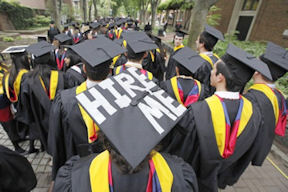Stop Asking Me My Major 0
Stop Asking Me My Major
By Scott Keyes
One of my best friends from high school, Andrew, changed majors during his first semester at college. He and I had been fascinated by politics for years, sharing every news story we could find and participating in the Internet activism that was exploding into a new political force. Even though he was still passionate about politics, that was no longer enough. “I have to get practical,” he messaged me one day, “think about getting a job after graduation. I mean, it’s like my mom keeps asking me: What can you do with a degree in political science anyway?”
 I heard the same question from my friend Jesse when students across campus were agonizing about which major was right for them. He wasn’t quite sure what he wanted to study, but every time a field sparked his interest, his father would pepper him with questions about what jobs were available for people in that discipline. Before long, Jesse’s dad had convinced him that the only way he could get a job and be successful after college was to major in pre-med.
I heard the same question from my friend Jesse when students across campus were agonizing about which major was right for them. He wasn’t quite sure what he wanted to study, but every time a field sparked his interest, his father would pepper him with questions about what jobs were available for people in that discipline. Before long, Jesse’s dad had convinced him that the only way he could get a job and be successful after college was to major in pre-med.
My friends’ experiences were not atypical.
Choosing a major is one of the most difficult things students face in college. There are two main factors that most students consider when making this decision. First is their desire to study what interests them. Second is the fear that a particular major will render them penniless after graduation and result in that dreaded postcollege possibility: moving back in with their parents. 
All too often, the concern about a major’s practical prospects are pushed upon students by well-intentioned parents. If our goal is to cultivate students who are happy and successful, both in college as well as in the job market, I have this piece of advice for parents: Stop asking, “What can you do with a degree in (fill in the blank)?” You’re doing your children no favors by asking them to focus on the job prospects of different academic disciplines, rather than studying what interests them.
It is my experience, both through picking a major myself and witnessing many others endure the process, that there are three reasons why parents (and everyone else) should be encouraging students to focus on what they enjoy studying most, rather than questioning what jobs are supposedly available for different academic concentrations.
The first is psychological. For his first two years of college, Jesse followed his dad’s wishes and remained a pre-med student. The only problem was that he hated it. With no passion for the subject, his grades slipped, hindering his chances of getting into medical school. As a result his employability, the supposed reason he was studying medicine in the first place, suffered.
The second reason to stop asking students what they can do with a major is that it perpetuates the false notion that certain majors don’t prepare students for the workplace. The belief that technical majors such as computer science are more likely to lead to a job than a major such as sociology or English is certainly understandable. It’s also questionable. “The problem,” as my friend Jos explained to me, “is that even as a computer-science major, what I learned in the classroom was outdated by the time I hit the job market.” He thought instead that the main benefit of his education, rather than learning specific skills, was gaining a better way of thinking about the challenges he faced. “What’s more,” he told me, “no amount of education could match the specific on-the-job training I’ve received working different positions.”
 Finally, it is counterproductive to demand that students justify their choice of study with potential job prospects because that ignores the lesson we were all taught in kindergarten (and shouldn’t ignore the closer we get to employment): You can grow up to be whatever you want to be. The jobs people work at often fall within the realm of their studies, but they don’t have to. One need look no further than some of the most prominent figures in our society to see illustrations. The TV chef Julia Child studied English in college. Author Michael Lewis, whose best sellers focus on sports and the financial industry, majored in art history. Matt Groening, creator of The Simpsons, got his degree in philosophy, as did the former Hewlett Packard chief executive Carly Fiorina. Jeff Immelt, chief executive of General Electric, focused on mathematics. Indeed, with the Department of Labor estimating that on average people switch careers (not just jobs) two or three times in their lives, relying on a college major as career preparation is misguided.
Finally, it is counterproductive to demand that students justify their choice of study with potential job prospects because that ignores the lesson we were all taught in kindergarten (and shouldn’t ignore the closer we get to employment): You can grow up to be whatever you want to be. The jobs people work at often fall within the realm of their studies, but they don’t have to. One need look no further than some of the most prominent figures in our society to see illustrations. The TV chef Julia Child studied English in college. Author Michael Lewis, whose best sellers focus on sports and the financial industry, majored in art history. Matt Groening, creator of The Simpsons, got his degree in philosophy, as did the former Hewlett Packard chief executive Carly Fiorina. Jeff Immelt, chief executive of General Electric, focused on mathematics. Indeed, with the Department of Labor estimating that on average people switch careers (not just jobs) two or three times in their lives, relying on a college major as career preparation is misguided.
 I’m not saying any applicant can get any job. Job seekers still need marketable skills if they hope to be hired. However, in a rapidly changing economy, which majors lead to what jobs is not so clear cut. Many employers look for applicants from a diverse background including my friend who has a degree in biochemistry but was just hired at an investment consulting firm.
I’m not saying any applicant can get any job. Job seekers still need marketable skills if they hope to be hired. However, in a rapidly changing economy, which majors lead to what jobs is not so clear cut. Many employers look for applicants from a diverse background including my friend who has a degree in biochemistry but was just hired at an investment consulting firm.
That doesn’t mean that majors no longer matter. It is still an important decision, and students are right to seek outside counsel when figuring out what they want to study. But questioning how a particular major will affect their employability is not necessarily the best approach. Although parents’ intentions may be pure after all, who doesn’t want to see their children succeed after graduation? That question can hold tremendous power over impressionable freshmen. Far too many of my classmates let it steer them away from what they enjoyed studying to a major they believed would help them get a job after graduation.
One of those friends was Andrew. He opted against pursuing a degree in political science, choosing instead to study finance because “that’s where the jobs are.” Following graduation, Andrew landed at a consulting firm. I recently learned with little surprise that he hates his job and has no passion for the work.
Jesse, on the other hand, realized that if he stayed on the pre-med track, he would burn out before ever getting his degree. During his junior year he changed tracks and began to study engineering. Not only did Jesse’s grades improve markedly, but his enthusiasm for the subject recently earned him a lucrative job offer and admission to a top engineering master’s program.
Andrew and Jesse both got jobs. But who do you think feels more successful?
Scott Keyes is a 2009 graduate of Stanford University, where he majored in political science.
